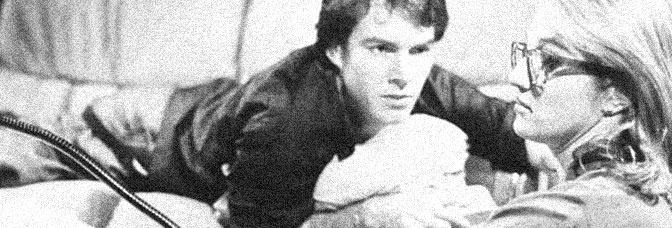There’s not much script structure like The Big Easy’s script structure. It’s an exceptionally constructed screenplay. The film’s great, but it all hinges on how Daniel Petrie Jr.’s script works. As previously introduced (whether onscreen or off) come back into the film, expanding on their original impression, as the relationship–okay, hold on, I’m getting ahead of myself.
The Big Easy is about assistant district attorney Ellen Barkin trying to ferret out some bad cops. Possible bad cop Dennis Quaid is on hand not just to investigate–and hopefully dissuade Barkin about her impression of the New Orleans Police Department–but also to romance her. Romancing her quickly turns into this whirlwind love affair, with lots of sex (director McBride, cinematographer Affonso Beato, and editor Mia Goldman compose a wicked sex scene–no male gaze until after it’s all over), lots of working together (they’re supposed to be on the same side), and lots of general chemistry. The first act of Big Easy establishes Quaid and Barkin as a wonderful screen pairing.
Shame about Quaid maybe being a dirty cop, which then sends the narrative into an entirely different direction. But Petrie works so many plots and subplots in the film, it’s not until the third act everything is established. Barkin spent the first act as protagonist, with that focus moving more to Quaid (who always shared it to some degree), but in the third act, Petrie and McBride have ground situation revelations in store.
The other thing about the script is how quick it all moves. The film’s present action is maybe a couple weeks… maybe. There’s always time to relax though–as Quaid (and the title) reminds everyone, it’s The Big Easy, after all. McBride and Beato love the New Orleans locations, with Barkin’s recent transplant seeing everything fresh (for the viewer). It’s often delightful–funny, warm, beautiful–but it’s also very, very rough. McBride works wonders with the tone; Barkin and Quaid’s chemistry, regardless of what the narrative requires, always takes precedence. It’s what makes the film after all.
As far as lead acting goes, it’s hard to say who’s better. At first it seems like Barkin has a deeper character, albeit less flashy. The flashiness initially seems too much for Quaid, but once there’s a deep dive into his character, the performance becomes a lot fuller. It’s easiest to let them share the top spot; The Big Easy’s acting, how Quaid and Barkin deal with the script’s developments, how McBride frames them, is exceptional.
The supporting cast is all strong, starting with third-billed Ned Beatty. He’s Quaid’s boss and future step-father. Lisa Jane Persky’s Quaid’s girl Friday. She’s awesome in the part. It probably shouldn’t be a bigger part, since she’s just there for exposition and banter, but Persky could’ve easily run a spin-off herself. McBride’s tone for the rather serious film is often genial and welcoming. Persky and Beatty help a lot with it. John Goodman and Ebbe Roe Smith are funny as dumb cops. Grace Zabriskie is awesome as Quaid’s mom. And Charles Ludlam makes a great lawyer.
Great music, both incidental, soundtrack, and Brad Fiedel’s playful score. It’s technically outstanding–Beato excels at whatever he needs to be lighting and Goldman’s editing is strong from the start. McBride uses a variety of techniques–including actors looking directly into the camera, something I usually loathe–to facilitate performances. The second act, which is the least “pleasant” of the film, is the best directed.
The Big Easy is fantastic.
 ★★★★
★★★★
CREDITS
Directed by Jim McBride; written by Daniel Petrie Jr.; director of photography, Affonso Beato; edited by Mia Goldman; music by Brad Fiedel; production designer, Jeannine Oppewall; produced by Stephen J. Friedman; released by Columbia Pictures.
Starring Dennis Quaid (Remy McSwain), Ellen Barkin (Anne Osborne), Ned Beatty (Jack Kellom), Lisa Jane Persky (McCabe), Tom O’Brien (Bobby McSwain), John Goodman (DeSoto), Ebbe Roe Smith (Dodge), Charles Ludlam (Lamar Parmentel), and Grace Zabriskie (Mama McSwain).
RELATED

Leave a Reply